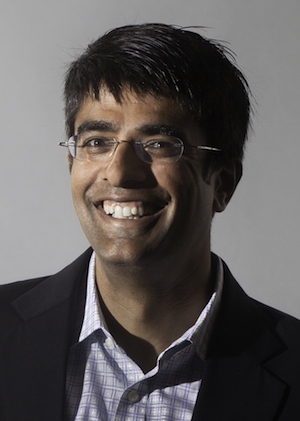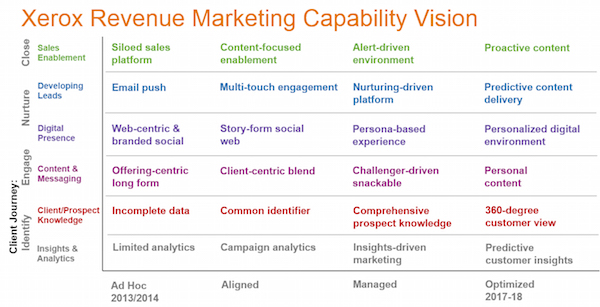Today we’re launching a series of interviews highlighting marketing technologists — who are they, what they do, and how they got there. We have a terrific line up of interviewees and plan to publish one a week for the next several months.
Our inaugural interview is with Jonathan Mendez, a quintessential marketing technologist. Jonathan is the Founder & CEO of Yieldbot — an innovative “real-time intent engine” for online advertising — and publishes the popular marketing blog Optimize & Prophesize. From his work at Omniture to his own agency, RAMP Digital, he’s helped companies such as Amazon.com, Disney, IBM, Monster.com, and T-Mobile leverage marketing technologies to improve performance.
Jonathan Mendez, Founder & CEO, Yieldbot
You’ve been an entrepreneur and thought leader at the nexus of marketing and technology for many years. How did you get into this space?
I was lucky to be born into it. My father is a technology entrepreneur and out of college I started working in the family business. This was the early days of C++ and we were writing our own software, building hardware and burning EPROM chips into IBM 286s.
Then one day around 1995, I got on the web for the first time. I decided at that moment that the web was going to change everything and I needed to get involved with it. The easiest way seemed to start a company that could sell things online. I founded an e-commerce business that sold vitamins and ended up doing that for 6 years.
I learned SEO, affiliate, and email marketing as well as UX, site optimization and of course analytics. I was lucky to get that foundation. E-commerce is a great place to start for anyone interested in marketing technology because it encompasses all aspects of it.
Over the years, how have you seen attitudes around technology change in marketing management? How has that impacted your work?
There has been slow acceptance of the role technology can play in decision-making. People seem very unwilling to cede this power to machines and data. Of course, it depends on the vertical as well. Direct marketers have been comfortable with data for decades. Brand marketers have been highly reluctant to move away from gut decisioning around “big ideas.”
I think the largest change is the realization that data collection enabled by marketing technology is more than numbers, it is the voice of the customer. This awareness impacted my work tremendously because I have always focused on using marketing technology to meet the goals of customers. It’s also why I moved in 2004 from e-commerce into search. Search is nothing but marketing technology for goal fulfillment.
“Data collection enabled by marketing technology is more than numbers, it is the voice of the customer.”
What are your thoughts on governing the intersection of agencies, technology vendors, marketing departments, and IT departments? Who should do what?
Wow, you are talking about a few minefields there. My experience is to give as much latitude to the technology vendor as possible and build your own in-house mindshare around the technology. In parallel, the stakeholders should be watching, learning and getting trained from the vendor.
The most important thing of all is someone needs to own the entire process from ideas to execution to results and that someone should always be marketing. Everyone else is a vendor or IT for marketing.
You’ve got tremendous expertise in the state-of-the-art of digital advertising. What’s most exciting to you in that field, and what should marketers — and marketing technologists — do to excel in it?
For a long time the most exciting thing for me has been real-time. That is why as a marketer search and then LPO [landing page optimization] were always so exciting to me. Never before could marketers know the exact moment of people were interested in receiving media. That ‘right time’ is a pillar of relevance and a touchstone to improving the web experience for people with things like dynamic landing page optimization and dynamic content.
Right now, I’m most interested in the marriage of this real-time data with the predictive intelligence that is becoming capable from “big data.” Things like Hadoop, cloud storage and custom algorithms will make us smarter as marketers and marketing technologist need to become very familiar with these services in order to excel.
Most of all, excelling as a marketing technologist requires a deep understanding of the marriage of qualitative and quantitative data. Data only tells half the story — it tells you what people did. It doesn’t tell you why they did it — or even more importantly sometimes why they didn’t do it.
“Excelling as a marketing technologist requires a deep understanding of the marriage of qualitative and quantitative data. Data only tells half the story.”
If you could give 30 seconds of wisdom on marketing technology to the CMO of a Fortune 500 company, what would you say?
Unless the business culture is ready for it and embraces technology, metrics, data, automation and optimization, whatever marketing technology you use will not succeed. However, if you create a culture of optimization — or as I like tell people, live the optimization lifestyle — you will be successful and gain market intelligence beyond your wildest imagination.
Any advice you would give to up-and-coming marketing technologists?
Two pieces of advice:
Don’t get stuck in one vertical or channel. People don’t use the web thinking about channels and verticals. The more you learn about search and display or auto and financial the smarter you become. A major reason for my success is that I’ve been fortunate to work in every major vertical and in every major digital marketing channel. Since most marketing patterns repeat experience means so much.
The second is around mindset. Do what you are doing to create more relevance on the web. If you keep that nobility about your work and focus on the customers goals, and not the business goals you will be successful no matter what technology you use and what business you use it with. This is a user-controlled medium. Behind all the technology, all the data and all the metrics are people. Don’t ever forget that.
“Behind all the technology, all the data and all the metrics are people. Don’t ever forget that.”
Thanks, Jonathan — great way to kick this series off!




This is a very nice interview, and there are thoughts that has to be considered when you’re planning your marketing campaign. Chief marketing technologist is a good job I bet.
Pete